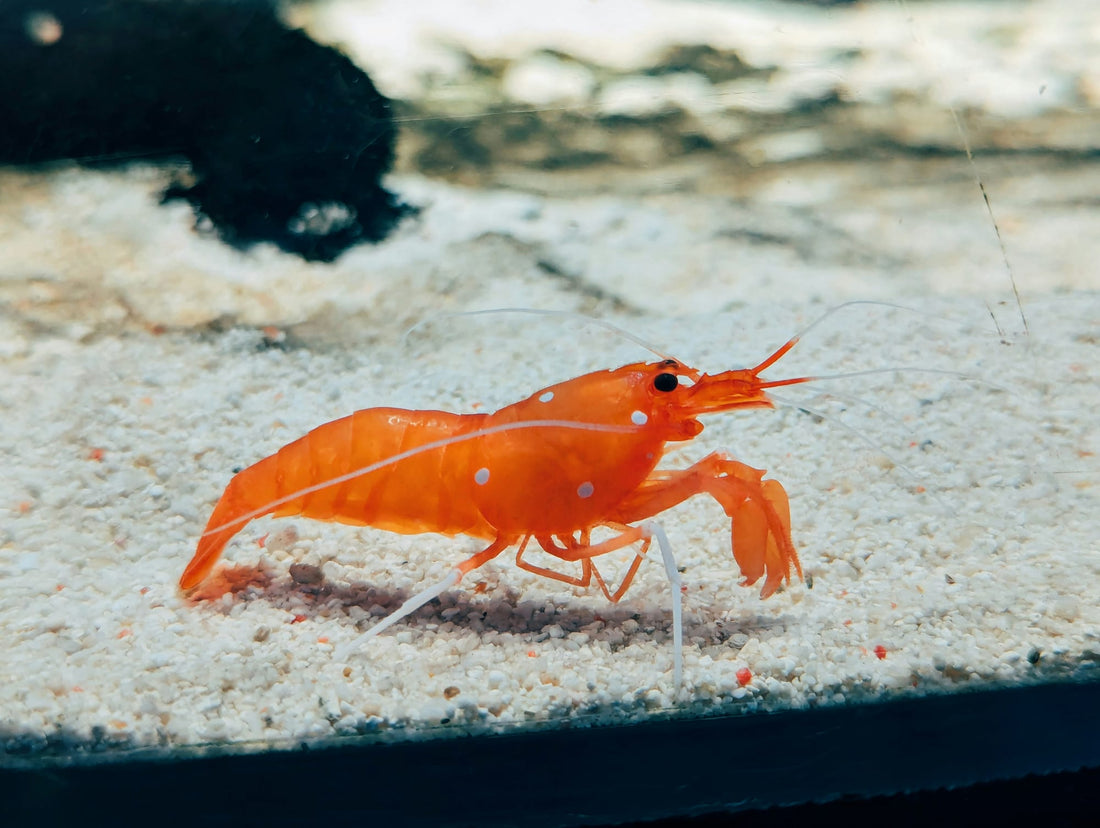Wellness Blog
The content on this blog is for general informational purposes only and is not a substitute for professional medical advice, diagnosis, or treatment. Always consult your healthcare provider before making changes to your health routine or taking new supplements.
Vitamins to boost immunity: Astaxanthin
There's an exhaustive list of supplements you can take for various health goals, and sometimes we might be a little spoiled for choice! One nutrient in supplement form that often goes unnoticed is astaxanthin. It has various functions in our bodies, some of which include being a natural antioxidant, acting as an anti-inflammatory agent that reduces free radicals formed in the body, and supporting the immune system.Astaxanthin is also one of the key vitamins that can support healthy immune system function, and you can take it regularly through diet or supplementation. It is naturally found in organisms that feed on it, such as salmon, and prawn - which is what gives them their red color (1). Let's get to know the role of astaxanthin in preserving our immune health.Benefits of astaxanthin in supporting immune healthHere are some of the ways astaxanthin can help support your immunity:Supports muscle performanceA great way to boost your immune system is by keeping your body healthy through exercise. Astaxanthin can be useful to your exercise regimen as it can support muscle performance and edurance (1). With the effects that astaxanthin has on our muscles, you could improve your exercise performance as well as help your immunity system get stronger.Helps reduce inflammationInflammation is part of your immune system response. It occurs when your body tries to heal itself from things like injuries, toxins, and infections. Whenever you see a wound swelling up or turning red, it's your body's immune system's response to an irritant like a germ or bacteria (2). However, too much inflammation can cause damage to the body. Inflammation is related to a long list of health ailments (6, 8).Astaxanthin supports your immune health by acting as an antioxidant which can decrease oxidative stress (3, 4). It has also been shown that because of its anti-inflammatory properties, astaxanthin has been used in clinical trials to treat metabolic syndrome, atherosclerosis, cognitive impairment, muscle damage, visual fatigue, and dermatological diseases with hopeful results (3).Maintains immune system healthAstaxanthin maintains immune system health by helping mitigate tissue damage that may occur due to excessive immune system response (8).Astaxanthin modulates the production of various immune system cells, without causing significant cytotoxic effects (7). It can also support healthy immune system function by stimulating the production of immune cells. Because of this astaxanthin may help in treating or preventing immune diseases.Other vitamins to boost immunityBesides astaxanthin, here are other vitamins that can support immune health which you can include as part of your everyday diet:Vitamin CVitamin C helps maintain healthy immune system function (9). This vitamin is found in citrus fruits, spinach, brussel sprouts, and papaya.Vitamin DVitamin D helps support the immune system by maintaining absorption of dietary nutrient intake (9). You can get this from the sun, as well as eating salmon, tuna, and sardines.IronIron is an antioxidant that reduces free radicals formed in the body, and helps the immune system to fight illness. Its main function in the body is to help carry oxygen to your cells (9). Iron can come from chicken, sardines, mussels, and broccoli.*Iron should only be taken if prescribed by your doctor.When paired with a healthy diet and regular exercise, astaxanthin can help support immune health. It's a good thing that Vitable Australia's subscription vitamin service carries supplements like astaxanthin and other vitamins that can help you achieve your daily nutrient intake to support immunity. The vitamin delivery service in Australia also ensures that you get your vitamins with ease!Find out more about other supplements that can support immunity:Zinc | Iron | Astaxanthin | Ashwagandha | Probiotic SB | B complex | Vitamin C | Vitamin D | Daily Probiotics| Vitamin B12 | Fish oil Biotin*Always read the label. Follow the directions for use. If symptoms persist, talk to your health professional. Vitamin and/or mineral supplements should not replace a balanced diet.References: Vitable. “Astaxanthin”. Vitable. Published (n.d.) on https://research.get.vitable.com.au/astaxanthin. Accessed December 5, 2021. National Center for Biotechnology Information. “What is an inflammation?”. National Center for Biotechnology Information. Published February 22, 2018 on https://www.ncbi.nlm.nih.gov/books/NBK279298/. Accessed December 5, 2021. Ruriko Nakao, O. Lynne Nelson, Jean Soon Park, Bridget D. Mathison, Pam A. Thompson And Boon P. Chew. “Effect of Astaxanthin Supplementation on Inflammation and Cardiac Function in BALB/c Mice”. Anticancer Research.. Published July 30, 2020 on https://ar.iiarjournals.org/content/30/7/2721#abstract-1. Accessed December 5, 2021. Ming Xian Chang and Fan Xiong . “Astaxanthin and its Effects in Inflammatory Responses and Inflammation-Associated Diseases: Recent Advances and Future Directions”. MDPI. Published November 16, 2020 on https://pdfs.semanticscholar.org/bccb/d601449aecde3071391236406c4efb08cf7f.pdf. Accessed December 5, 2021. Harvard University: Science in the News. “The Reason for the Season: why flu strikes in winter”.Harvard University: Science in the News. Published December 1, 2014 on https://sitn.hms.harvard.edu/flash/2014/the-reason-for-the-season-why-flu-strikes-in-winter/. Accessed December 5, 2021. William Snyder. " The Good, The Bad and the Ugly of Inflammation". Vanderbilt School of Medicine. Published Feb 10, 2015 on https://medschool.vanderbilt.edu/vanderbilt-medicine/the-good-the-bad-and-the-ugly-of-inflammation/. Accessed December 24, 2021. Kuan-Hung Lin, et. al., "Astaxanthin, a Carotenoid, Stimulates Immune Responses by Enhancing IFN-γ and IL-2 Secretion in Primary Cultured Lymphocytes in Vitro and ex Vivo". International Journal of Molecular Sciences. Published Jan 2016 on https://www.ncbi.nlm.nih.gov/pmc/articles/PMC4730289/. Accessed December 24, 2021. Muscular Dystrophy. " Immune System Modulation". Updated July 2019 on https://musculardystrophynews.com/immune-system-modulation/. Accessed December 24, 2021. Cleveland Clinic. "8 Vitamins & Minerals You Need for a Healthy Immune System". Published n.d. on https://health.clevelandclinic.org/eat-these-foods-to-boost-your-immune-system/. Accessed December 24, 2021.
Learn moreAstaxanthin – What Is It and Why Do We Need It?
Astaxanthin is a natural compound that has been gaining attention in the wellness world. This red pigment, found in certain marine life, is a type of carotenoid—a group of plant-based nutrients known for their antioxidant properties. It's what gives salmon, krill, and shrimp their vibrant colour and is often highlighted for its potential to support overall health.But what exactly is astaxanthin, and why is it worth considering? Let's explore where it comes from, how it works, and how it might support your wellness goals.What is Astaxanthin?Astaxanthin is a carotenoid with antioxidant properties. Antioxidants are substances that help protect our cells from oxidative stress, a process linked to aging and everyday wear and tear. Unlike some other carotenoids like beta-carotene, astaxanthin has a unique structure that allows it to work in different parts of the body.Found naturally in algae, this compound plays a protective role in harsh environments, helping the organisms that produce it to thrive. Humans can benefit from it as well, particularly when it comes to supporting healthy cells and tissues.What is Astaxanthin Made From?The primary source of natural astaxanthin is a type of freshwater microalgae called Haematococcus pluvialis. When these algae face stressful conditions, such as intense sunlight or lack of nutrients, they produce astaxanthin as a defense mechanism.Marine animals like salmon and shrimp consume these algae, which gives them their reddish colour. While there is also synthetic astaxanthin, many people prefer the natural form because it's derived from these whole food sources.Photo by note thanun on UnsplashWhy Might Astaxanthin Be Helpful?Astaxanthin is known for its antioxidant properties, which help support overall health by reducing oxidative stress. It also interacts with cell membranes, making it a versatile compound for maintaining healthy cells.Some research suggests astaxanthin may play a role in areas like skin health and muscle recovery. However, its effects can vary from person to person, and it's always a good idea to discuss new supplements with a healthcare provider.Potential Benefits of AstaxanthinHere are some areas where astaxanthin may offer support:1. Antioxidant SupportAstaxanthin helps reduce free radicals formed in the body, which in turn decreases free radical damage to body cells. This antioxidant action supports general health and wellbeing.2. Skin HealthAstaxanthin can help maintain skin health by supporting skin hydration and elasticity. It also helps protect the skin's internal structure and elastin from breaking down, contributing to overall skin integrity and reducing skin irritation or sensitivity.3. Eye HealthAstaxanthin plays a role in maintaining eye health, including supporting the health of the macula and retina. It may also help reduce visual fatigue, which is particularly useful for those who spend long hours in front of screens.4. Muscle Performance in AthletesFor those who engage in physical activities, astaxanthin can help maintain muscle performance, endurance, and stamina. Its antioxidant properties assist in reducing oxidative stress that occurs during exercise.5. Cognitive FunctionAstaxanthin helps maintain cognitive function in aging individuals by supporting healthy mental processes. This is particularly important for those looking to support brain health over time.6. Immune System HealthAstaxanthin supports the immune system by promoting healthy immune function and helping the body maintain its natural defenses.7. Support for Healthy Blood LipidsAstaxanthin also helps in the maintenance of healthy blood lipids (fats), contributing to overall cardiovascular wellness.Numerous studies highlight astaxanthin's exceptional antioxidant power (1, 2). Research demonstrates that astaxanthin supplementation reduces inflammation, improves skin elasticity, and enhances muscle endurance (3, 4, 5).In a clinical study, athletes taking astaxanthin experienced reduced muscle fatigue and improved endurance, showcasing its potential to enhance physical performance (6).How to Take AstaxanthinAstaxanthin is available in supplement form, typically as capsules or soft gels. Common dosages range from 4–12 mg daily, depending on individual needs. Taking astaxanthin with a meal that includes healthy fats may help improve absorption.Our Astaxanthin is a pure, natural extract from marine algae which is naturally rich in astaxanthin. As with any supplement, it's best to start with a lower dose and consult a healthcare professional, especially if you're considering higher amounts for specific wellness goals.A Nutrient Worth ExploringAstaxanthin is much more than a vibrant pigment—it's a powerhouse nutrient with far-reaching benefits for your skin, muscles, brain, and heart. Backed by scientific evidence, this natural carotenoid is an effective and versatile addition to your wellness routine.Whether you're looking for an antioxidant, to protect your skin from signs of aging, or support overall well-being, astaxanthin is an extraordinary nutrient that offers a compelling solution.Looking for the only personalised vitamin packs in Australia? Get your personalised supplements from Vitable. Vitable lets you take out a monthly vitamin subscription, with a vitamin delivery service to bring your packs to your doorstep.*Always read the label. Follow the directions for use. If symptoms persist, talk to your health professional. Vitamin and/or mineral supplements should not replace a balanced diet.References Fassett, R. G., & Coombes, J. S. (2011). Astaxanthin: a potential therapeutic agent in cardiovascular disease. Marine drugs, 9(3), 447–465. https://doi.org/10.3390/md9030447 Sztretye, M., Dienes, B., Gönczi, M., Czirják, T., Csernoch, L., Dux, L., Szentesi, P., & Keller-Pintér, A. (2019). Astaxanthin: A Potential Mitochondrial-Targeted Antioxidant Treatment in Diseases and with Aging. Oxidative medicine and cellular longevity, 2019, 3849692. https://doi.org/10.1155/2019/3849692 Pereira, C. P. M., Souza, A. C. R., Vasconcelos, A. R., Prado, P. S., & Name, J. J. (2021). Antioxidant and anti‑inflammatory mechanisms of action of astaxanthin in cardiovascular diseases (Review). International journal of molecular medicine, 47(1), 37–48. https://doi.org/10.3892/ijmm.2020.4783 Davinelli, S., Nielsen, M. E., & Scapagnini, G. (2018). Astaxanthin in Skin Health, Repair, and Disease: A Comprehensive Review. Nutrients, 10(4), 522. https://doi.org/10.3390/nu10040522 Hecht K.A., Schnackenberg J., Nair A., Lignell Å. Global Perspectives on Astaxanthin. Elsevier; Amsterdam, The Netherlands: 2021. Astaxanthin for improved muscle function and enhanced physical performance; pp. 447–467. [Google Scholar] Bjørklund, G., Gasmi, A., Lenchyk, L., Shanaida, M., Zafar, S., Mujawdiya, P. K., Lysiuk, R., Antonyak, H., Noor, S., Akram, M., Smetanina, K., Piscopo, S., Upyr, T., & Peana, M. (2022). The Role of Astaxanthin as a Nutraceutical in Health and Age-Related Conditions. Molecules (Basel, Switzerland), 27(21), 7167. https://doi.org/10.3390/molecules27217167
Learn more





